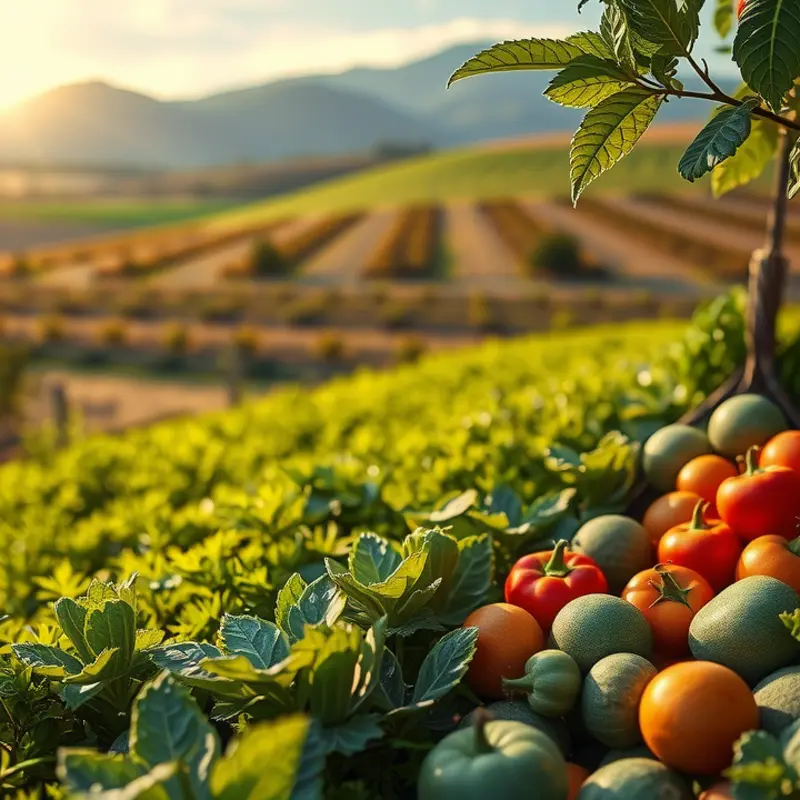Eco-friendly dining is not merely a trend; it is an essential shift towards sustainable living. By choosing organic, locally sourced produce and reducing food waste, we can significantly mitigate our environmental footprint. Each meal presents an opportunity to support eco-friendly practices that benefit our planet and promote personal health. Embracing sustainable eating allows us to enjoy delicious food while respecting the earth’s resources, making a positive impact for future generations.
Sourcing Sustainable Ingredients

Prioritizing the use of locally sourced, organic ingredients is foundational to an eco-friendly dining experience. By understanding where our food originates, we can significantly minimize our environmental footprint. This chapter delves into practical methods for identifying and integrating sustainable sources into everyday meals.
One effective approach is to support local farmers’ markets. These venues offer fresh, seasonal produce that typically travels a shorter distance to reach your kitchen, thus reducing transportation emissions. By choosing to purchase food directly from local farmers, you also support the local economy and encourage sustainable agricultural practices.
Another way to promote sustainability is by implementing a seasonal menu at home. Seasonal eating is not only about enjoying ingredients at their peak flavor and nutritional value but also about reducing the need for out-of-season produce that requires long-distance transportation or energy-intensive cultivation methods. Crafting a menu based on seasonal availability can enhance the quality of your meals and reduce environmental impact significantly. Here is a guide on practical ingredient batching to efficiently manage seasonal produce in your meal planning.
Understanding certification labels is essential in identifying sustainable ingredients. Organic certifications are among the most recognized, indicating that the produce is grown without synthetic chemicals, sewage sludge, irradiation, or genetic engineering. Fair Trade labels ensure that producers receive fair compensation, supporting economic sustainability. By familiarizing yourself with these and other certifications, you can make informed purchasing decisions aligned with your eco-friendly values.
Additionally, sourcing ingredients that have been responsibly caught or harvested can contribute to sustainability. The seafood industry, in particular, has a significant environmental footprint, making it crucial to look for certifications that indicate sustainable fishing practices. By choosing seafood that adheres to rigorous standards, you lower your carbon footprint and help preserve marine ecosystems.
Finally, it’s valuable to build relationships with local food producers. Engaging directly with farmers or joining a Community Supported Agriculture (CSA) program enables you to understand farming practices better and ensure that sustainability is prioritized. This connection not only provides transparency but also fosters a sense of community around eco-friendly dining practices.
By committing to sourcing sustainable ingredients, whether through local markets, understanding labels, or cultivating direct relationships, you make significant strides towards eco-friendly dining. Every conscious choice helps create a healthier planet, one meal at a time.
Minimizing Food Waste and Recycling

Reducing food waste is a cornerstone of sustainable dining. No matter the size of your kitchen, conscious practices can make a world of difference. Meal planning is one vital step. Planning meals not only helps reduce grocery bills but also curbs impulsive buys that often lead to waste. Begin by assessing your pantry and fridge, focusing on items that need to be used soon. Craft weekly menus that strategically incorporate these ingredients. This ensures older items don’t go to waste.
Effective food storage is another key. Proper storage extends the lifespan of your groceries, helping you manage your resources wisely. For instance, using airtight containers can significantly slow spoilage. To dive deeper into storage techniques, consider exploring eco-smart kitchen storage, which offers insights into maintaining food freshness.
Harness the power of cooking with leftovers to unlock creative culinary potential. Leftovers are not just reheated meals; they can be transformed into entirely new dishes. For example, roast chicken can be repurposed into savory tacos or hearty soups. Leftover rice might become the base for a vegetable stir-fry. Embrace creativity and turn yesterday’s excess into today’s gourmet meal.
Moreover, composting is an effective method of recycling organic waste. Instead of sending scraps to landfills, composting allows you to enhance the nutrient value of your soil. This simple yet effective practice supports local ecosystems and reduces methane emissions from decomposition. All you need is a little space and the right mix of organic materials. Over time, these materials break down into rich compost, giving back to the earth what it gave us.
Recycling goes beyond plastic and glass. Think about recycling cooking oil or even coffee grounds. Used coffee grounds, for instance, can become a garden powerhouse, enriching soil and repelling pests. Similarly, by recycling used cooking oil, you can prevent the contamination of water systems and reduce pollution.
By adopting these practices, each household becomes a small yet significant part of a larger movement towards sustainability. Every conscious choice in the kitchen and at the table contributes to minimizing waste, nourishing the environment, and supporting a closed-loop food system. These steps can dramatically decrease contributions to landfills, promoting a healthier planet for future generations.
Final words
Embracing eco-friendly dining practices fosters a connection to the food we consume and empowers us to take responsibility for our environmental impact. By sourcing sustainable ingredients and minimizing food waste, we become champions for a healthier planet. Simple changes in our eating habits not only enhance personal health but also promote the well-being of our ecosystem. Let’s continue to inspire each other to make conscious food choices that support both ourselves and the environment—together, we can create a sustainable future.








